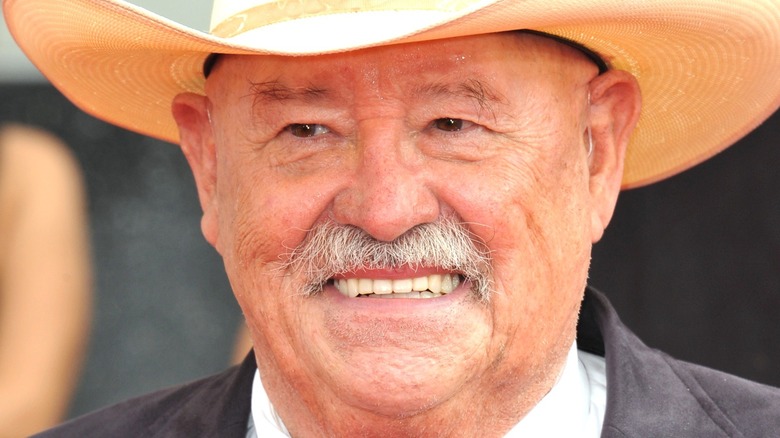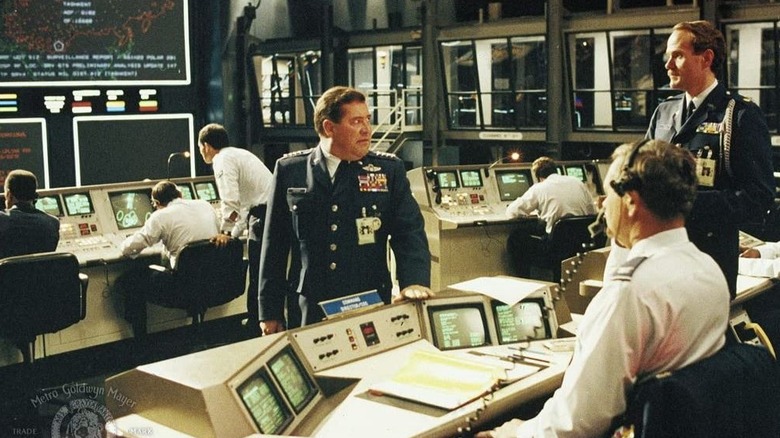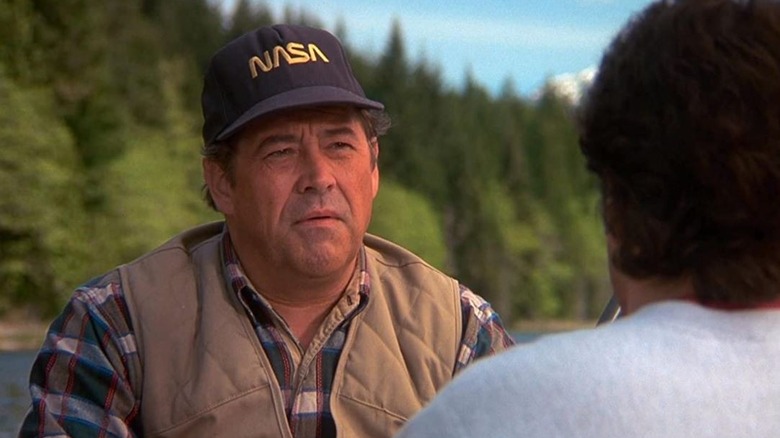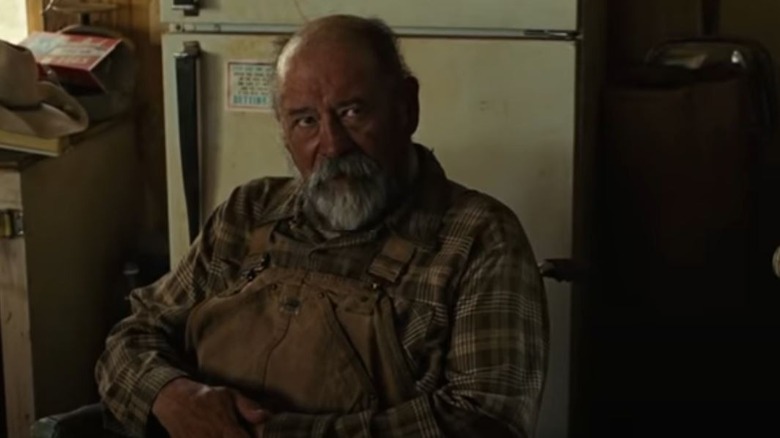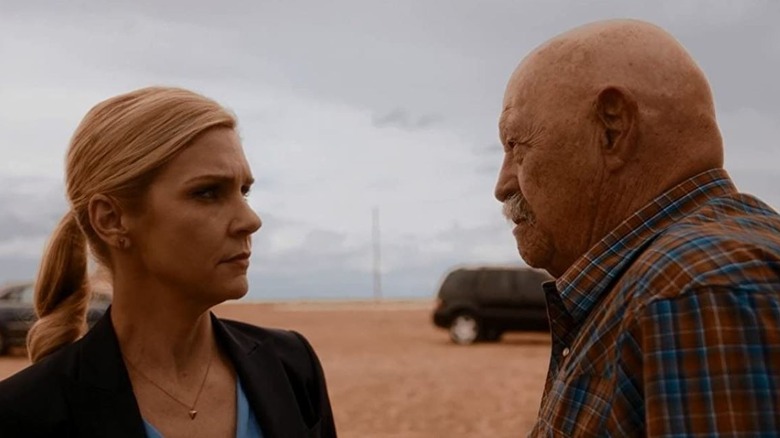Why Ross From Yellowstone Season 4 Looks So Familiar
Paramount Network's "Yellowstone" just can't help adding talent to its sizable roster, can it? The fifth episode of the neo-Western's Season 5 takes ranch hand-turned-exiled rodeo man Jimmy Hurdstrom (Jefferson White) to the 6666 Ranch in Texas, after John Dutton (Kevin Costner) banishes him for overt rodeo antics. On the new ranch, the viewers are treated to a rendezvous with real-life cowboy legend Buster Welch, which is pretty cool. However, from an acting point of view, the senior ranch hand at the 6666, Ross, is an even more interesting addition.
Ross is played by Barry Corbin, who's been hard at acting work since 1976. During his four and a half decades in the business, he's amassed a truly staggering CV. Some of the shows and movies he's appeared in over the years are stone cold classics, while others you've probably never heard about. You might not immediately remember where you've seen him before, thanks to the many roles (and multiple facial hair styles) he's had over his years in the industry. Come, let's help the old memory by taking a quick look at some of the roles you might remember him from.
Barry Corbin is General Beringer in WarGames
Barry Corbin became something of a household name early on, thanks to his roles in early-1980s movies like "Urban Cowboy," and a nine-episode guest stint as the corrupt Sheriff Washburn in the hit soap opera "Dallas." However, one of his first true smash hit successes was 1983's "WarGames," the critically acclaimed (via Rotten Tomatoes) sci-fi thriller that received three Academy Award nominations and a multitude of other accolades.
The movie tells the story of young hacker David (Matthew Broderick), who accesses a military computer called WOPR and unwittingly starts a "game" that, in reality, brings the world to the brink of a nuclear apocalypse. Corbin plays General Beringer, the chief military authority figure in the movie, who's understandably, vocally and constantly irked at the seemingly unsolvable situation, and ultimately embraces David's help with one of the more memorable line readings out there: "Goddamn it! I'd piss on a spark plug if I thought it'd do any good! Let the boy in there, Major."
Incidentally, Corbin has told Texas Monthly that he came up with the line himself, drawing inspiration from a particular real-life incident from his childhood.
Barry Corbin is Maurice Minnifield in Northern Exposure
From 1990 to 1995, Barry Corbin portrayed main character Maurice Minnifield in CBS' comedic drama Northern Exposure. Maurice is the big man of Cicely, Alaska in more ways than one. An incredibly bombastic millionaire, astronaut, military pilot and businessman, he's basically Alaska's own, grumpy Iron Man without the suit. Despite his notorious attitude and often nefarious-seeming plans, he hides a heart of gold and is generally prepared to join the side of the angels whenever necessary ... even though the character's various problematic attitudes would almost certainly land both him and the show in trouble in modern days.
The role earned Corbin two Emmy nominations, and in a 2020 interview with Digital Journal, the actor said he has largely fond memories of this era. "That was very good. I enjoyed 'Northern Exposure' up until the last season, where it got a bit strange," Corbin said, presumably referring to the show's increasingly weird plot twists and drawn-out death throes circa 1995 (via the Los Angeles Times).
Barry Corbin is Ellis in No Country for Old Men
In 2007, Barry Corbin was part of one of the most celebrated films of the decade, "No Country for Old Men." Arguably the magnum opus of Joel and Ethan Coen, this chilling, thoughtful neo-Western about a Texan man (Josh Brolin), an elderly sheriff (Tommy Lee Jones), and an impossibly creepy assassin (Javier Bardem) raked in awards and accolades, and is filled to the brim with memorable scenes.
Bardem's pageboy-haired, cattle gun-wielding Anton Chigurh obviously dominates the conversation when iconic "No Country for Old Men" moments are discussed, but one of the film's most pivotal scenes comes when Jones' Ed Tom Bell visits his elderly wheelchair-bound relative Ellis (Corbin) in the latter's cat-infested rural hovel. The scene reveals that Ed Tom intends to retire, because the ongoing case has been too much for him. Ellis — a former lawman himself — has seen this before, and delivers a pretty moving monologue that both brushes on the movie's theme of fate, and reveals why the movie is called that. "What you got ain't nothing new," he advises the aging Ed Tom. "This country's hard on people. You can't stop what's coming. It ain't all waiting on you. That's vanity."
In an interview with the A.V. Club, Corbin revealed that he was originally pretty wary of the one-scene role, mostly taking a peek at the script because he knew Jones was in the movie. This, of course, changed the second he actually got to the powerful scene. "Then I got to that scene, read it, and said, 'Whoa, wait a minute!'", Corbin said. "I went back and read it again, and I didn't even finish the script. I called my manager up and said, 'Sure I'll take that part! That scene's the movie!'"
Barry Corbin is Everett Acker in Better Call Saul
No one does "grumpy" like Barry Corbin, and few of Corbin's roles have been grumpier than Mr. Everett Acker, the holdout homeowner in "Better Call Saul" who's stuck in a land dispute with Kim Wexler's (Rhea Seehorn) employees, the Mesa Verde company. Though Acker only appears in three episodes of the show, he's an incredibly important part of the season — first as the immovable object that's posited against Kim's unstoppable force, and then as the centerpiece of Kim and Jimmy's (Bob Odenkirk) characteristically complex machinations against Mesa Verde in order to help the old man out.
Corbin's thoroughly unimpressed face is instrumental in his portrayal of the seething and mistrustful Acker, but as the actor once told Screen Radar, this hasn't always been the case. "I was doing a show one time and the director said, 'OK cut, cut, cut'," Corbin described his one-time experiences with an unnamed project. "He came over and said, 'Don't make that face.' I said, 'Well, you hired this face. You don't like this face? He said 'No, I just don't like that face that you made.' So, I said, 'Tell me to think some different. It doesn't help to tell me just not to make that face.' He said, 'Well then think some different ... all right, action!' I did the same way and he said that it was great."
